

"Just Breathe" Mindfulness for Kids: Games, Worksheets and Activities. What If Schools Taught Kindness? Walking to class one day, one of us (Laura) saw a young student crying and waiting for his mother to arrive—he had split his chin while playing.
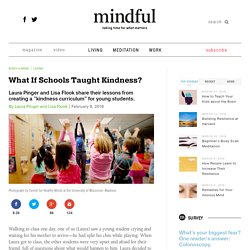
When Laura got to class, the other students were very upset and afraid for their friend, full of questions about what would happen to him. Laura decided to ask the class how they could help him. “Caring practice!” Exclaimed one of the children—and they all sat in a circle offering support and well wishes. The children immediately calmed and they continued with their lesson. This is what’s possible when kids learn to be kind at school. Various mindfulness programs have been developed for adults, but we and our colleagues at the Center for Healthy Minds at the University of Wisconsin, Madison, wanted to develop a curriculum for kids.
We ended up bringing a 12-week curriculum to six schools in the Midwest. Why teach kindness to kids? Noticing: Connecting with Our Kids in the Midst of Busy Lives. Since my daughter, Opal, was just over a year old (she’s now six), I’ve tried to make a point of carving out what we call “special time” with her.
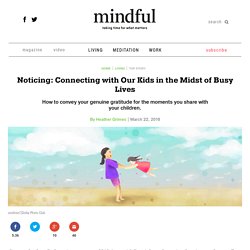
This is time that I’m with her with zero interruptions. No email. No break for tea (unless it is her idea). No extra-long bathroom sessions where I sneak a look at my phone. Sometimes it’s only 10, 15, 30 minutes, but I try to do it every day or every couple of days. But lately I’ve noticed a major gap in my recall of the last many months of special times. And I would have likely continued in this vein had sickness not recently intervened. Opal was home sick from school and we pieced together an entire day in the house, little by little. First, we played ‘Shopkins Store’ and I observed just how thoughtfully Opal arranged the tiny figurines by style and color.
In our post-play lassitude, we flopped down on the couch and Opal leaned in for a hug. “This is the best time I have ever had with you,” she said. So there we were on the couch together. Mindful Parents Raise Less Stressed-Out Kids. You really can’t pass any magazine rack today without seeing something about mindfulness.
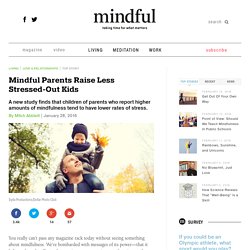
We’re bombarded with messages of its power—that it helps reduce the effects of stress, improves your immune function, and even improves your decision-making skills. While it’s surely not a cure-all, it is overwhelmingly established by controlled scientific studies to be of value in living a healthy, engaged, and less stressful life (1) (2). A Better Way to Teach Kids About Emotions. Child Psychology. Fairy Tales. Raise Mentally Strong Kids.
How to Awaken Joy in Kids. Can joy be cultivated?
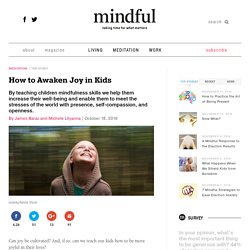
And, if so, can we teach our kids how to be more joyful in their lives? The answer to both of these questions is yes. But it takes knowing what kinds of practices bring true happiness—and not just momentary pleasure—to your life. Bedtime Mindfulness: A Gratitude Body Scan for Children. “Mummy, can we do a different mindfulness practice tonight?”
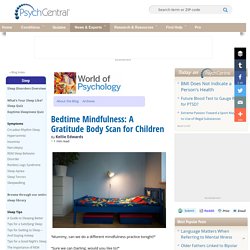
“Sure we can Darling, would you like to?” “uh-huh.” “OK, close your eyes, and settle down into your bed and take your attention down to your feet. “Feel from the inside where your feet are in the bed, where they are touching the sheet and silently thank your feet for walking you around all day. 8 Ways to Lean into Negative Thoughts for Kids. “Don’t worry, be happy.”
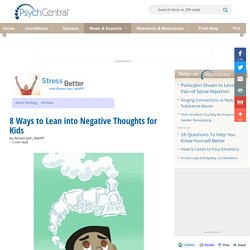
“Big kids don’t cry.” “Fake it until you make it.” From a young age, we are taught to deal with our negative thoughts and emotions by quashing them or transforming them into something more positive. Unfortunately, much of this effort results in the avoidance of difficult feelings. When we try to avoid a natural part of the human condition (e.g., sadness, hurt, jealousy, anger etc.), it does not make these feelings go away. What can we do instead? 1. 2. 3. 4. 5. 6. 7. Simple Ways to Help Young Kids Develop Self-Control. The first five years of life are a period of significant brain development, but some regions of the brain mature more slowly than others.
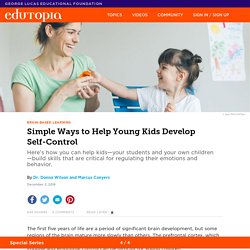
The prefrontal cortex, which is the home base of executive function, is one such region, which explains why impulse and emotional control can be difficult for young children. Still, aspects of executive function, including the ability to focus attention and working memory and to self-regulate actions, can be improved with explicit teaching, support, and practice, even among preschoolers. And there is good reason for parents and early childhood educators to work with young children to help them develop these abilities. Several major longitudinal studies show that preschoolers who exhibit self-regulatory behaviors go on to experience more success in school and are more likely to avoid risky behaviors in adolescence than their peers who have a hard time with self-control. Green Light for Self-Regulation Establish routines. How Can We Best Teach Kids Compassion in Education? (+ 21 Activities)